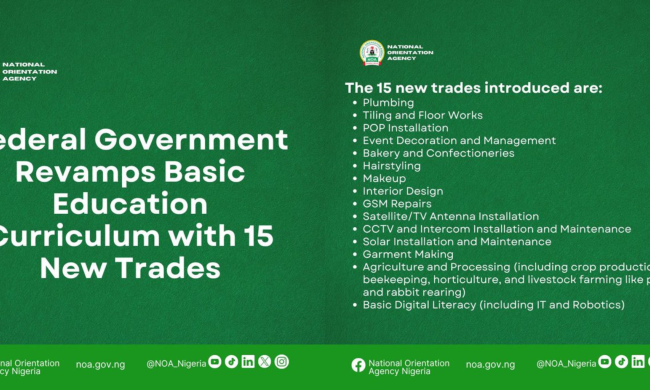The Nigerian government has made a significant move aimed at improving students’ practical skills and employability by introducing 14 new trades to the Basic Education curriculum. This decision was announced in a statement issued by the National Orientation Agency (NOA) on Thursday, January 23, 2025. The new subjects, which will take effect from January 2025, are designed to help primary and junior secondary school students across the country acquire essential hands-on skills.
These newly introduced trades span a wide range of industries, ensuring that students have the opportunity to explore various career paths. The subjects include plumbing, tiling and floor works, POP (Plaster of Paris) installation, event decoration and management, battery and confectionery production, hairstyling, makeup artistry, and interior design. In addition, the government has added technical subjects such as GSM repairs, satellite/TV antenna installation, CCTV and intercom installation and maintenance, solar installation and maintenance, garment making, and agricultural subjects including crop production, beekeeping, horticulture, and livestock farming like poultry and rabbit rearing. Basic Digital Literacy, which covers information technology (IT) and robotics, has also been included in the new curriculum.
This initiative is part of the Nigerian government’s ongoing efforts to bridge the skills gap in the country and prepare the younger generation for the demands of the modern workforce. By integrating these practical skills into the education system, the government aims to make students more competitive in the job market and equip them with skills that can lead to self-employment or entrepreneurial ventures.
The addition of these trades is a step towards aligning the country’s educational system with the growing need for technical and vocational skills in various sectors. With Nigeria’s economy diversifying, especially in technology and agriculture, the need for skilled workers in these fields has never been more critical. In particular, the focus on digital literacy and emerging technologies such as robotics reflects the global trend of digital transformation in industries worldwide.
Furthermore, the inclusion of trades like plumbing, tiling, and hairstyling is expected to address the skills shortage in sectors that have high demand for skilled workers. In many parts of Nigeria, there is a significant demand for workers in these fields, and the government’s decision to incorporate them into the curriculum provides an opportunity for students to gain expertise in areas that have a direct impact on everyday life and economic activities.
Education experts and stakeholders have welcomed the move, recognizing its potential to address the growing youth unemployment rate in Nigeria. The country’s unemployment situation has remained a challenge for years, with a large number of young people struggling to secure formal jobs. By providing students with practical skills that are in high demand, the government is giving them the tools to become self-sufficient and contribute to the economy in meaningful ways.
Agricultural education, which includes beekeeping, crop production, and animal husbandry, is another key area of focus in the new curriculum. Agriculture remains a vital sector for Nigeria, particularly in rural areas, where farming and livestock rearing are major sources of livelihood. The inclusion of these subjects will not only promote sustainable farming practices but also help ensure food security in the country. The focus on agriculture aligns with the government’s efforts to encourage diversification from oil dependence and boost local production of food and agricultural products.
The emphasis on solar installation and maintenance is also timely, given Nigeria’s power challenges. With frequent power outages affecting many parts of the country, solar energy has become an increasingly popular alternative for households and businesses. By teaching students how to install and maintain solar systems, the government is encouraging the adoption of renewable energy sources, which could help address Nigeria’s energy deficit in the long run.
The incorporation of Basic Digital Literacy, IT, and robotics into the curriculum is particularly significant in the digital age. As the world becomes more connected and reliant on technology, the demand for skilled workers in IT and related fields continues to grow. By introducing these subjects early in the education system, Nigeria is preparing its young population to take advantage of the opportunities that the digital economy offers.
The new curriculum is expected to be implemented across schools in Nigeria, starting with primary and junior secondary levels. This means that students will be exposed to these subjects from an early age, giving them ample time to develop their skills before entering the workforce. The government has also pledged to ensure that teachers receive the necessary training and resources to effectively teach these new subjects, which could involve updating school infrastructure and providing specialized materials for practical training.
While the government’s initiative is being praised, there are challenges to overcome in ensuring the success of the new curriculum. One major concern is the need for adequate funding and resources to support the introduction of these trades. Schools will need proper tools and equipment to teach subjects like plumbing, hairstyling, and solar installation. Teachers will also need continuous training to keep up with the latest industry trends and techniques.
There is also the challenge of ensuring that these subjects are taught with the same level of seriousness and attention as traditional academic subjects like mathematics and English. In many parts of the country, vocational education has often been seen as secondary to academic subjects, and this perception will need to change if the new curriculum is to be successful.
Moreover, there will be a need for strong collaboration between the government, private sector, and educational institutions to ensure that the skills being taught match the needs of the job market. Partnerships with industry leaders and businesses will help ensure that students receive practical training that is relevant to current industry standards.
Despite these challenges, the government’s decision to add these trades to the Basic Education curriculum marks a significant step forward in addressing the skills gap in Nigeria. With the right support and implementation, this initiative has the potential to create a generation of skilled workers who are ready to contribute to the country’s economic growth and development.

